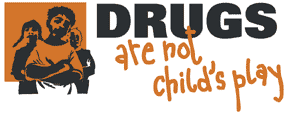 The United Nations Office on Drugs and Crime has declared today “International Day against Drug Abuse and Illicit Trafficking.” And they’re doing it with the theme “Drugs are Not Child’s Play,” which ranks in terms of pure exploitive hype right alongside National Lampoon’s Buy This [Magazine] or We’ll Shoot This Dog
The United Nations Office on Drugs and Crime has declared today “International Day against Drug Abuse and Illicit Trafficking.” And they’re doing it with the theme “Drugs are Not Child’s Play,” which ranks in terms of pure exploitive hype right alongside National Lampoon’s Buy This [Magazine] or We’ll Shoot This Dog — just not as funny.
UNODC has selected “drugs are not child’s play” as the theme of its 2006 international campaign, in an effort to increase public awareness about the destructive power of drugs and society’s responsibility to care for the well-being of children. The latest estimates indicate that 200 million people, or 5 per cent of the global population age 15-64, have consumed illicit drugs at least once in the last 12 months. But what about kids? What about children (aged 4 to 10)?
Although they are seldom the object of national and international studies, children of all ages are affected by drug abuse and illicit trafficking. Street children, working and living in dire conditions, are vulnerable, as are boys and girls whose family members are buying or selling illicit substances. These kids are exposed not only to bad examples but also to violent behaviour associated to drug abuse. In some instances, children have lost their parents to this scourge and are now cared for by uncles, aunts or grandparents. At school, the situation may not be any better. Teenagers and peers may be pressuring kids to smoke cigarrettes and drink alcohol, at first, and then to try marihuana. Other types of drugs may follow.
UNODC’s anti-drugs campaign urges adults to protect children.
And so we should. One of the first and most important steps would be to dismantle the UNODC. It is, after all, the policies promoted by the UNODC that makes trafficking profitable and increases the danger to children.

